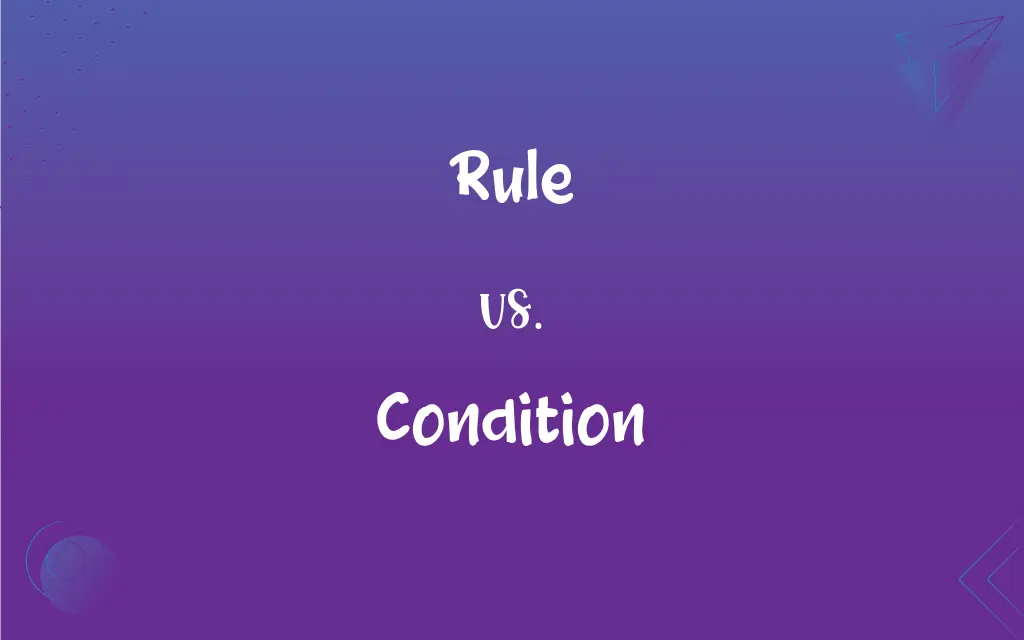Rule vs. Condition: What's the Difference?
Edited by Janet White || By Harlon Moss || Updated on November 11, 2023
"Rule" is a prescribed guide for conduct or action, whereas "condition" refers to a specific requirement or state of being.

Key Differences
A rule is a set guideline or principle designed to govern behavior or processes, often established by an authority or common consent. A condition, on the other hand, refers to a particular requirement that must be fulfilled for something to happen or a statement of circumstances or facts.
Rules are often established to maintain order, fairness, or safety, and can be found in games, laws, and organizational policies. While, conditions are more about stipulations or states that affect the operation or existence of something, like terms in a contract or the state of health.
Rules typically imply a directive that should be followed, and breaking a rule can lead to consequences or penalties. Conditions, however, are more about prerequisites or criteria that need to be met for certain outcomes.
Rules are often universally applicable within a certain context, like classroom rules or traffic laws. However, conditions can be more variable, depending on specific situations or agreements, like weather conditions or the conditions of a deal.
While rules are guidelines or instructions that dictate how one should act, conditions are the requirements or states that influence or determine situations and outcomes.
ADVERTISEMENT
Comparison Chart
Definition
Guideline or instruction for behavior
Requirement or state affecting something
Purpose
To govern behavior or processes
To stipulate requirements or describe states
Application
Universal within a context
Specific to situations or agreements
Consequence
Breaking a rule can lead to penalties
Not meeting a condition affects outcomes
Examples
Rules of a game, traffic laws
Health conditions, terms of a contract
ADVERTISEMENT
Rule and Condition Definitions
Rule
A prescribed guide for conduct.
The first rule of the club is confidentiality.
Condition
A state of being or existence.
The condition of the car was excellent.
Rule
A standard method or procedure.
The rule in mathematics for order of operations is important.
Condition
Circumstances affecting the way things are.
The weather conditions affected the flight schedule.
Rule
A principle governing behavior.
The golden rule is to treat others as you want to be treated.
Condition
A stipulation or requirement.
One condition of the lease is no pets allowed.
Rule
A regulation established by authority.
The school's rules include a dress code.
Condition
Something that must be fulfilled.
Conditions for the agreement were carefully negotiated.
Rule
Control or dominion over an area.
The rule of law is essential for democracy.
Condition
The state of health.
Her medical condition required immediate attention.
Rule
Governing power or its possession or use; authority.
Condition
A mode or state of being
We bought a used boat in excellent condition.
Rule
The duration of such power.
Condition
Conditions Existing circumstances
Economic conditions have improved. The news reported the latest weather conditions.
Rule
An authoritative, prescribed direction for conduct, especially one of the regulations governing procedure in a legislative body or a regulation observed by the players in a game, sport, or contest.
FAQs
Who makes rules?
Authorities, organizations, or groups establish rules.
What is a rule?
A prescribed guide for conduct or action.
What does condition mean?
A specific requirement or state of being.
Are rules always legal?
No, they can also be informal guidelines.
Can conditions change?
Yes, conditions can vary depending on circumstances.
What is a physical condition?
The state of one's physical health or being.
Are conditions always mandatory?
Often, especially in contracts or agreements.
Can conditions be negotiated?
Yes, particularly in agreements or contracts.
What happens if you break a rule?
It can lead to consequences or penalties.
Do rules apply to everyone?
Generally, within the context they are established.
What's an example of a condition?
A condition in a contract, such as a warranty.
Can rules change?
Yes, they can evolve with time or circumstances.
Can rules be unwritten?
Yes, as in social or cultural norms.
Can conditions be health-related?
Yes, referring to medical states or health issues.
How are rules enforced?
Through authority, policies, or social consensus.
Are there rules in games?
Yes, to govern play and ensure fairness.
Is a condition a limitation?
It can be, setting boundaries or requirements.
Are rules important?
Yes, for order, fairness, and safety.
What are weather conditions?
The state of the weather at a particular time and place.
Do conditions apply in finance?
Yes, in terms of loan agreements or investments.
About Author
Written by
Harlon MossHarlon is a seasoned quality moderator and accomplished content writer for Difference Wiki. An alumnus of the prestigious University of California, he earned his degree in Computer Science. Leveraging his academic background, Harlon brings a meticulous and informed perspective to his work, ensuring content accuracy and excellence.
Edited by
Janet WhiteJanet White has been an esteemed writer and blogger for Difference Wiki. Holding a Master's degree in Science and Medical Journalism from the prestigious Boston University, she has consistently demonstrated her expertise and passion for her field. When she's not immersed in her work, Janet relishes her time exercising, delving into a good book, and cherishing moments with friends and family.































































